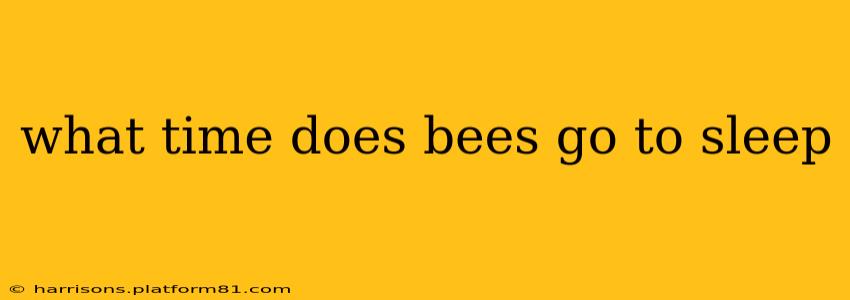What Time Do Bees Go to Sleep? Unraveling the Mystery of Bee Sleep
The question "What time do bees go to sleep?" isn't as simple as it seems. Bees don't have a set bedtime like humans, and their sleep patterns are surprisingly complex and fascinating. Instead of a single "sleep time," their rest periods are scattered throughout the day and night, influenced by several factors. Let's delve into the intricacies of bee sleep.
Do Bees Sleep at Night?
While bees aren't completely inactive at night, they do exhibit periods of rest and reduced activity. Honeybees, for instance, will typically cluster together in their hive at night, conserving energy and warmth. This isn't a deep, unconscious sleep like humans experience, but rather a state of inactivity and reduced responsiveness. Individual bees will cycle through periods of rest and activity throughout the night, depending on their role in the hive and environmental conditions.
What Factors Influence Bee Sleep?
Several factors influence when and how much bees rest:
- Age: Younger bees tend to be more active and have shorter rest periods than older bees.
- Role in the hive: Forager bees (those collecting pollen and nectar) often have more irregular sleep patterns due to their demanding work schedule. Nurse bees, responsible for caring for the young, also have different sleep patterns.
- Temperature: Cold temperatures can significantly impact bee activity and lead to longer periods of rest.
- Light levels: While not as reliant on light as humans, bees are sensitive to changes in light levels, which can influence their activity and rest cycles.
How Do Bees Sleep?
Bee sleep is characterized by periods of inactivity and reduced responsiveness to stimuli. They may appear still and immobile, often clinging to the comb within the hive. Unlike humans, bees don't experience REM sleep (Rapid Eye Movement sleep). Instead, their rest periods are characterized by reduced muscle activity and a decreased metabolic rate. Studies have shown that bees even exhibit "sleep paralysis," a temporary inability to move immediately upon waking.
How Long Do Bees Sleep?
The duration of a bee's rest periods varies widely depending on the factors mentioned above. Some bees might rest for just a few minutes at a time, while others might have longer periods of inactivity, especially at night or during inclement weather. The total amount of sleep a bee gets in a 24-hour period is also variable, with studies suggesting it could range from several hours to just a few minutes of deep rest, interspersed with many short periods of inactivity.
Do Different Types of Bees Sleep Differently?
While the general principles of bee sleep apply across many species, there can be subtle variations. For example, solitary bees, which don't live in colonies, might have different rest patterns compared to social bees like honeybees. Further research is needed to fully understand the diversity of sleep patterns across different bee species.
What Happens if Bees Don't Get Enough Sleep?
Just like humans, bees need adequate rest to function properly. Sleep deprivation in bees has been shown to negatively impact their cognitive abilities, including their navigational skills and learning capacity. It can also affect their foraging efficiency and overall health, potentially impacting the entire colony.
In conclusion, the question of "What time do bees go to sleep?" lacks a simple answer. Instead, bee rest periods are dynamic and influenced by numerous factors, making their sleep patterns a fascinating area of ongoing research. The complexity of their sleep highlights the intricate lives and essential roles these vital pollinators play in our ecosystem.
